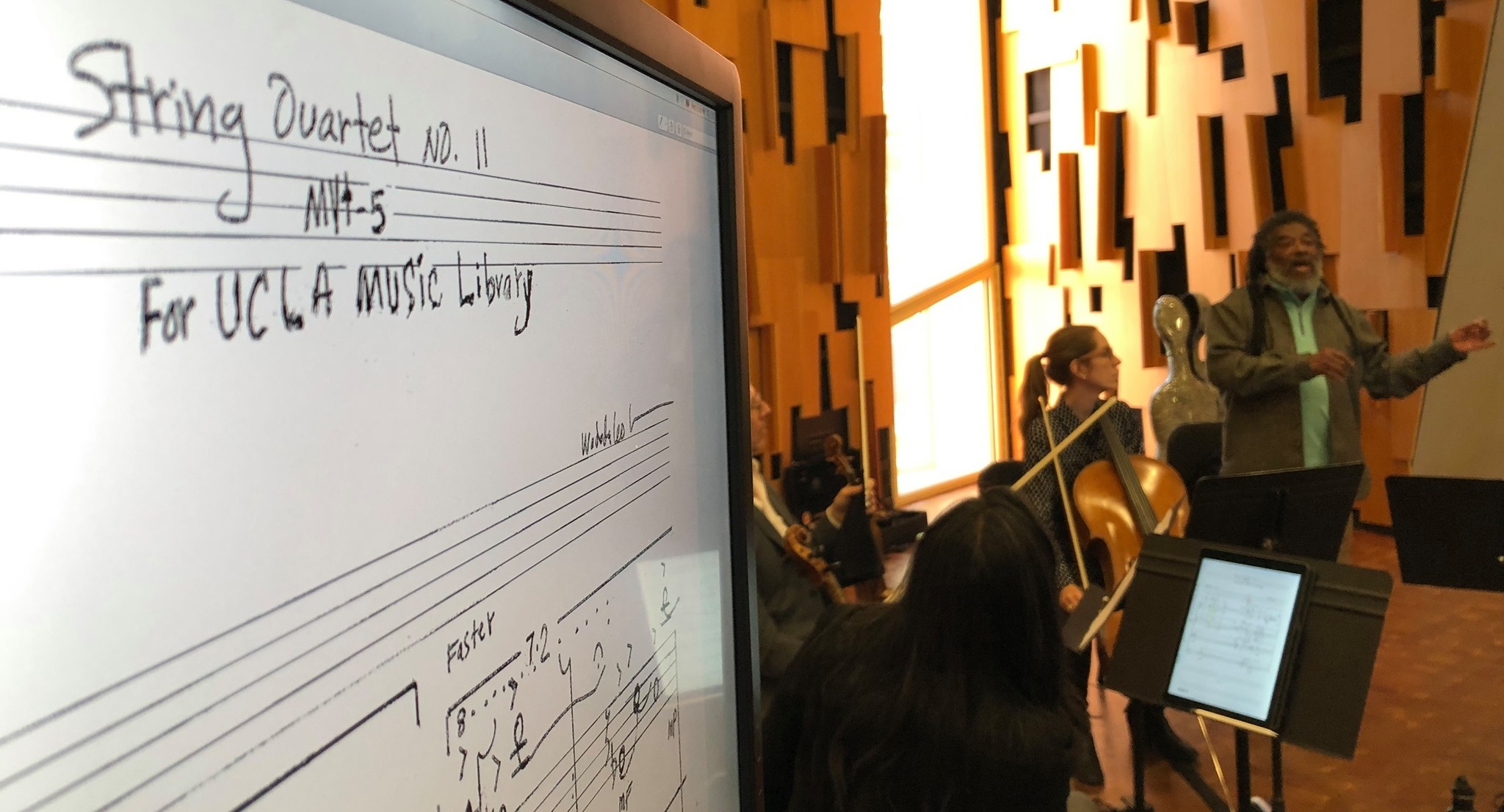More Information
Music Library-commissioned work supports the advancement of contemporary music
Wadada Leo Smith, the trumpeter and composer, spent two weeks as a UC Regents Lecturer at UCLA, presenting workshops(opens in a new tab), holding open rehearsals(opens in a new tab) of his music, participating in a conversation(opens in a new tab) with UCLA musicologist Nina Eidsheim at the Hammer Museum, among other initiatives. In recognition of both his commitment to UCLA music scholars and his decades-long, genre-defying career, Smith received the UCLA Medal(opens in a new tab), the highest honor bestowed upon an individual by the university.
Following the medal presentation ceremony on Nov. 8, a performance by the RedKoral Quartet included the premiere of movement 5 from his String Quartet No. 11, entitled “UCLA Music Library.” Through its Hugo Davise Fund for Contemporary Music, the Music Library commissioned this work. The Davise fund is administered by the Library to support contemporary music in a wide variety of ways including the purchase of music materials for use in teaching and learning, commissioning new musical works, and the publication of the Contemporary Score Edition, the first open-access music edition published by a library.
Smith, Eidsheim, and a Herb Alpert School of Music student who participated in the residency discuss his recent honor, the inspiration driving “UCLA Music Library,” and the response it evokes in the listener.
The UCLA Music Library is a movement.
“I am tremendously grateful that I've been able to attend so many of the events with Wadada Leo Smith,” said fourth-year musicology student Matthew Gilbert. “Each time I hear him speak or play, I feel like I walk away with some new insight into not only his performance practice, but also how music affects our world and how we move through it. I find his music invigorating, literally life-giving. He is the most welcoming and warm person I've ever met. He makes me want to make music.”
“Collaboration between faculty and research librarians, many of whom are scholars in their own right, is one of the oldest and most important relations within the university ecology,” explained Eidsheim, professor of musicology in the UCLA Herb Alpert School of Music. “Working with Matthew Vest at the UCLA Music Library to identify a composer with whom UCLA share values in areas of social justice and in a desire to expand musical expression is one of my proudest UCLA moments.”
“My main object was to show two kinds of musical properties,” Smith said of the string quartet. “The first property is sound as being distinguished from harmony. I chose sound because sound has no peculiarity as to where it has to move, and therefore I am open to moving in any direction. The second quality is unison. I asked myself, how can unison have meaning in the 21st century?”
“No other string quartet music sounds like this.”
“No other string quartet music sounds like this,” music critic Mark Swed wrote in the LA Times(opens in a new tab) for a feature story on Smith’s residency. “There is a gripping, centered power of near electromagnetic energy. But beyond the center, when the quartet plays in unison or in thick chordal passages, is a freer energy on the fringes, almost like the sun with its corona. Smith also says that it’s not where the music is going that is important, but its potential to reveal unexpected possibilities.”

“The ‘UCLA Music Library’ movement was very poignant for me,” Gilbert elaborated. “He managed to illuminate for me how I relate to this space, rather than how it feels or sounds to be within it. I think it may have to do with the temporal relationship between the mission of the Library to both preserve and serve, as if we're living in the past, present, and futures all at once, or at least that we're uniquely aware of it. His piece made me nostalgic for something that hasn't happened yet, but that inevitably will: That someday I'll leave here and never return.”
…“symbolically represents the idea of education, knowledge, and wisdom of which the library is an important vehicle”…
Smith further clarified his approach in the string quartet: “Essentially, my research was to use unison for a major portion of the composition and at various points construct something that seems like a drone but with multiple changes in the sound, all utilized in unison in some ways, with an occasional one or two different notes within the orchestration which gives the impression that the unison is slipping back and forth between unison to sound. It becomes very difficult to tell when these moments occur because to keep the unions interesting, I have used multiple displacements of octaves from using pitch/sound as octaves, but also harmonics to use larger notions of octaves. The sound portion symbolically represents the inquiring mind of the individual and the collective. And the unison portion symbolically represents the idea of education, knowledge, and wisdom of which the Library is an important vehicle to achieve those goals.”
